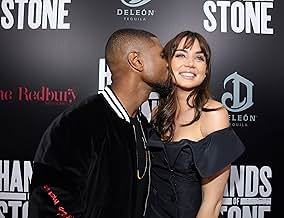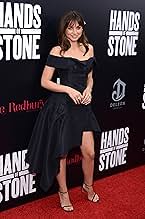PUNTUACIÓN EN IMDb
6,6/10
18 mil
TU PUNTUACIÓN
El legendario Roberto Durán y su igualmente legendario entrenador Ray Arcel cambian las vidas el uno del otro.El legendario Roberto Durán y su igualmente legendario entrenador Ray Arcel cambian las vidas el uno del otro.El legendario Roberto Durán y su igualmente legendario entrenador Ray Arcel cambian las vidas el uno del otro.
- Dirección
- Guión
- Reparto principal
- Premios
- 2 premios en total
Usher
- Sugar Ray Leonard
- (as Usher Raymond IV)
Pedro Perez
- Plomo
- (as Pedro 'Budú' Pérez)
Jurnee Smollett
- Juanita Leonard
- (as Jurnee Smollett-Bell)
Ilza Ponko
- Clara Samaniego
- (as Ilza Rosario)
Eliud Garcia
- Margarito Duran
- (as Eliud Kauffman)
Reseñas destacadas
"Hands of Stone" (2016 release; 195 min.) is a bio-pic about Panama boxing legend Roberto Duran. as the movie opens, it is"Madison Square Garden, 1971" and we dive straight into a Duran fight, while Ray Arcel (played by Robert de Niro) is checking it out. As Duran makes quick work of his opponent, Arcel's voice over comments "In 66 seconds, Duran changed my life". Arcel is convinced by Duran's manager to train him, to make him the next world champion. We then go to "US Canal Zone, January 9, 1964", as we see little Roberto participate in the social protests surrounding the Panama Canal. At this point we are 10 min. into the movie, but to tell you more of the plot would spoil your viewing experience, you'll just have to see for yourself how it all plays out.
Couple of comments: this move is written and directed by little known Venezuelan director Jonathan Jakubowicz. The cast is strong, no doubt about it. De Niro gets to play in yet another boxing film, and he knows the ropes (sorry, no punt intended) like no other. A big surprise was to see Ellen Barkin, playing his wife (and now in her early 60s if you can believe it). Another big surprise was to see the role of Sugar Ray Leonard played by none other than the singer Usher, who does quite well in fact. Edgar Ramirez plays Duran convincingly. Some of the boxing scenes are quite good, but there is nothing that you haven't seen before. The movie's big challenge is that the script seems strictly by-the-numbers. There isn't much that comes as a surprise, the movie brings the required romantic interest, etc. It all feels very straight-forward, and hence there was no emotional investment on my part to feel connected to any of this. I was simply watching it, nothing less, nothing more. Last but not least, there was a nice orchestral score, courtesy of composer Angelo Milli.
The movie opened two weekends ago on a handful of screens here in Cincinnati. The Tuesday evening screening where I saw this at was attended okay but not great, which probably is the norm for a weekday evening. "Hands of Stone" certainly isn't bad per se, but neither is it an unexpected pleasant surprise (such as "Creed" last Fall). If you are into boxing, or boxing moves, this is worth checking out, be it in the theater, on Amazon Instant Video or eventually on DVD/Blu-ray.
Couple of comments: this move is written and directed by little known Venezuelan director Jonathan Jakubowicz. The cast is strong, no doubt about it. De Niro gets to play in yet another boxing film, and he knows the ropes (sorry, no punt intended) like no other. A big surprise was to see Ellen Barkin, playing his wife (and now in her early 60s if you can believe it). Another big surprise was to see the role of Sugar Ray Leonard played by none other than the singer Usher, who does quite well in fact. Edgar Ramirez plays Duran convincingly. Some of the boxing scenes are quite good, but there is nothing that you haven't seen before. The movie's big challenge is that the script seems strictly by-the-numbers. There isn't much that comes as a surprise, the movie brings the required romantic interest, etc. It all feels very straight-forward, and hence there was no emotional investment on my part to feel connected to any of this. I was simply watching it, nothing less, nothing more. Last but not least, there was a nice orchestral score, courtesy of composer Angelo Milli.
The movie opened two weekends ago on a handful of screens here in Cincinnati. The Tuesday evening screening where I saw this at was attended okay but not great, which probably is the norm for a weekday evening. "Hands of Stone" certainly isn't bad per se, but neither is it an unexpected pleasant surprise (such as "Creed" last Fall). If you are into boxing, or boxing moves, this is worth checking out, be it in the theater, on Amazon Instant Video or eventually on DVD/Blu-ray.
The sad thing is, this is a movie that every American should see and understand, but that that is almost impossible, there's just too much disinformation standing between us and the truth.
This is not a big film but that Robert De Niro was willing to lend his considerable talents to it speaks volumes about its worth. The story is a true one more than difficult to find in news reports at the time and so all the more jarring when told with the passionate clarity that it gets here.
I admit I have a very personal point of view about this movie. I was stationed in Panama when Duran was fighting. I wish I could have seen him fight, but the closest I came was being outside a stadium and being stunned at the uproar coming from it. I asked someone what was going on and they said Roberto Duran was fighting. Roberto was more than just a fighter to Panamanians, he was their hero. The Chorrillo district he grew up in was mostly slum. To come up from such poverty seems more than heroic to anyone familiar with the area, it's downright miraculous.
As Ray Arcel, his trainer, said, Roberto had some of the best instincts he'd ever seen. He was a natural fighter. His weakness was he was also a man prone to excess and excessive pride and the film does not shrink from those flaws. But to its credit it also doesn't shrink from putting the US in a less than admirable light.
There's more that isn't mentioned in this film, such as the highly suspicious way General Torrijos, president of Panama, died, or the extensive prostitution our military base promotes which Roberto would have witnessed. Still this movie is a vast improvement over the usual way Hollywood portrays Central America.
The acting is excellent throughout though I especially enjoyed Ana de Armas' portrayal of Roberto's wife, Felicidad, for the memories it gave me.
This is not a big film but that Robert De Niro was willing to lend his considerable talents to it speaks volumes about its worth. The story is a true one more than difficult to find in news reports at the time and so all the more jarring when told with the passionate clarity that it gets here.
I admit I have a very personal point of view about this movie. I was stationed in Panama when Duran was fighting. I wish I could have seen him fight, but the closest I came was being outside a stadium and being stunned at the uproar coming from it. I asked someone what was going on and they said Roberto Duran was fighting. Roberto was more than just a fighter to Panamanians, he was their hero. The Chorrillo district he grew up in was mostly slum. To come up from such poverty seems more than heroic to anyone familiar with the area, it's downright miraculous.
As Ray Arcel, his trainer, said, Roberto had some of the best instincts he'd ever seen. He was a natural fighter. His weakness was he was also a man prone to excess and excessive pride and the film does not shrink from those flaws. But to its credit it also doesn't shrink from putting the US in a less than admirable light.
There's more that isn't mentioned in this film, such as the highly suspicious way General Torrijos, president of Panama, died, or the extensive prostitution our military base promotes which Roberto would have witnessed. Still this movie is a vast improvement over the usual way Hollywood portrays Central America.
The acting is excellent throughout though I especially enjoyed Ana de Armas' portrayal of Roberto's wife, Felicidad, for the memories it gave me.
As a kid I would watch boxing matches with my grandfather. I remember asking him; "Do they ever just quit?" He went on to tell me the story of a man this film is based on. Hands Of Stone chronicles the chaotic life and career of former Panamanian boxer Roberto Duran, as seen through the eyes of his trainer. While it is visually similar to most boxing movies, it's about real people who lived very real lives, that happen to revolve around boxing. At times it plays like a documentary. Taking the viewer on an emotional roller coaster ride with it. There is limited time for character development. The cuts are quick and the story moves right along, much like the rounds of a boxing match.
In 1971, Roberto Duran (Edgar Ramirez) fights at Madison Square Garden - an incredible accomplishment at a notable venue, considering Duran's humble origins. The eventual lightweight champion's story is narrated by his legendary trainer, Ray Arcel (Robert De Niro), a man who helped thousands of boxers master the sport, and who now must teach the kid strategy and discipline to become a true winner. And taking into account De Niro's own expertise with boxing movies, it's difficult not to trust everything he says about the up-and-comer. But despite star power, a respectable budget, and suitable performances, the film is an utter failure when it comes to visual style, technical execution, and storytelling.
The first problem is the narrative, which alternates between the past and the present, hoping to shed some light on the traumatic events that shaped each player. But it goes too far, wasting time on Arcel's personal drama (including estrangement from a daughter) while also focusing pointlessly on the supporting characters that interact with him. This should be Duran's story, but quite routinely, it pays unnecessary attention to Arcel, promoter Carlos Eleta (Ruben Blades), wiseguy Frankie Carbo (John Turturro), childhood pal Chaflan (Oscar Jaenada), and even the primary opponent, Sugar Ray Leonard (Usher Raymond). This is especially detrimental when Duran inevitably falls from grace; it allows the audience to lose interest in - and concern for - the antihero at the heart of it all, since there are so many other characters to follow. Even Roberto's wife Felicidad (Ana de Armas) is more sympathetic and believable (she's also featured in the only amusing scene, involving pleasurable intercourse that shifts into torturous childbirth).
All of the cutting back and forth in the timeline is dreadfully commonplace - as well as irritating - lending to the feeling that this biographical yarn is so familiar and clichéd that twisting up its chronology must surely confuse audiences into thinking that it's modern and fresh. This leads into the second problem: "Hands of Stone" quickly becomes a history lesson disguised as a boxing movie.The 1964 Panama Canal Zone rioting was a significant, potent piece of a longstanding territorial conflict, but it just doesn't fit seamlessly into a film about Duran's rise and fall in the ring. The idea of fighting his whole life becomes comically downplayed when he's shown to literally begin streetfighting as a preteen on the poverty-ridden streets of El Chorrillo, before receiving more formal training by a coach at a local gym. And then there's time for a love story, which follows the typical course of recklessness with wealth and eventually drunken abuse.
It's not enough to be an inspirational sports drama anymore - and definitely not when it comes to boxing, which has seen a tremendous quantity of theatrical efforts in the last few years alone. Just like Duran's immoral choices when it comes to psychological warfare and his motives for controversially (and famously) stopping his rematch against Leonard (depicted here to involve unscrupulous actions by a greedy agent and a mental defeat rather than overconfident slacking), "Hands of Stone" seems to have been made for all the wrong reasons. At times it's a bit of patriotic propaganda for Panama (it regularly resembles advertising or promotion instead of entertainment); at others it's an account of a detestable athlete, incapable of handling riches and celebrity - and certainly written poorly enough that he's irredeemable as a hero (a penultimate redemption bout is portrayed to be painfully trivial). Audiences are also supposed to believe (inconceivably) that this hotheaded brute used superior intelligence to distract his nemesis, rather than merely spitting out insults in the heat of the moment.
In its hastiness to chronicle the singular Panamanian star, the film also can't be bothered with acceptable editing and structuring techniques; fades, cuts, fight choreography, and transitions betray severely amateurish efforts. Sequences are included out of expectation, not creativity; training montages, the segueing of rounds, and even sex/nudity appear because the filmmakers think these moments are anticipated - or required. For viewers unaware of the 1980 "Brawl in Montreal" and the rematch that followed later in the same year, "Hands of Stone" at least presents an unexpected (though not entirely satisfying) third option to that age-old dilemma of any pugilist showdown: the protagonist can only win or lose, and both choices have been previously, repeatedly committed to celluloid.
The first problem is the narrative, which alternates between the past and the present, hoping to shed some light on the traumatic events that shaped each player. But it goes too far, wasting time on Arcel's personal drama (including estrangement from a daughter) while also focusing pointlessly on the supporting characters that interact with him. This should be Duran's story, but quite routinely, it pays unnecessary attention to Arcel, promoter Carlos Eleta (Ruben Blades), wiseguy Frankie Carbo (John Turturro), childhood pal Chaflan (Oscar Jaenada), and even the primary opponent, Sugar Ray Leonard (Usher Raymond). This is especially detrimental when Duran inevitably falls from grace; it allows the audience to lose interest in - and concern for - the antihero at the heart of it all, since there are so many other characters to follow. Even Roberto's wife Felicidad (Ana de Armas) is more sympathetic and believable (she's also featured in the only amusing scene, involving pleasurable intercourse that shifts into torturous childbirth).
All of the cutting back and forth in the timeline is dreadfully commonplace - as well as irritating - lending to the feeling that this biographical yarn is so familiar and clichéd that twisting up its chronology must surely confuse audiences into thinking that it's modern and fresh. This leads into the second problem: "Hands of Stone" quickly becomes a history lesson disguised as a boxing movie.The 1964 Panama Canal Zone rioting was a significant, potent piece of a longstanding territorial conflict, but it just doesn't fit seamlessly into a film about Duran's rise and fall in the ring. The idea of fighting his whole life becomes comically downplayed when he's shown to literally begin streetfighting as a preteen on the poverty-ridden streets of El Chorrillo, before receiving more formal training by a coach at a local gym. And then there's time for a love story, which follows the typical course of recklessness with wealth and eventually drunken abuse.
It's not enough to be an inspirational sports drama anymore - and definitely not when it comes to boxing, which has seen a tremendous quantity of theatrical efforts in the last few years alone. Just like Duran's immoral choices when it comes to psychological warfare and his motives for controversially (and famously) stopping his rematch against Leonard (depicted here to involve unscrupulous actions by a greedy agent and a mental defeat rather than overconfident slacking), "Hands of Stone" seems to have been made for all the wrong reasons. At times it's a bit of patriotic propaganda for Panama (it regularly resembles advertising or promotion instead of entertainment); at others it's an account of a detestable athlete, incapable of handling riches and celebrity - and certainly written poorly enough that he's irredeemable as a hero (a penultimate redemption bout is portrayed to be painfully trivial). Audiences are also supposed to believe (inconceivably) that this hotheaded brute used superior intelligence to distract his nemesis, rather than merely spitting out insults in the heat of the moment.
In its hastiness to chronicle the singular Panamanian star, the film also can't be bothered with acceptable editing and structuring techniques; fades, cuts, fight choreography, and transitions betray severely amateurish efforts. Sequences are included out of expectation, not creativity; training montages, the segueing of rounds, and even sex/nudity appear because the filmmakers think these moments are anticipated - or required. For viewers unaware of the 1980 "Brawl in Montreal" and the rematch that followed later in the same year, "Hands of Stone" at least presents an unexpected (though not entirely satisfying) third option to that age-old dilemma of any pugilist showdown: the protagonist can only win or lose, and both choices have been previously, repeatedly committed to celluloid.
- The Massie Twins (GoneWithTheTwins.com)
Hands of Stone is a rise, fall and rise again story of famed Panamanian boxer Roberto Duran (Ramirez) who leapt into notoriety in the 70's after his first controversial appearance at Madison Square Gardens. By the time of his retirement in 2002 at the age of 50, he had 199 fights under his belt with 103 wins and four titles as a light weight, welter weight, light middle weight and middle weight. The film however focuses on his relationship with legendary boxing trainer Ray Arcel (De Niro) whose own exploits in the boxing world made him the first trainer to be inducted into the Boxing Hall of Fame.
Doing a movie of this nature, a couple of questions arise. How do you accurately and intimately make a film about the life and times of Roberto Duran who in addition to being a legend was also a legendary pre-fight s**t talker? How can one best encapsulate the real life of a man who at one point was the guiding light of an entire nation yet had enough of an ego to name all of his male heirs Roberto? Finally, how do you do make that movie great while siphoning off of cues and themes from inspirations like Rocky (1976) and Raging Bull (1980)?
The answer is of course you can't; but you can make a half-way decent film out of everything. And that's basically what director Jonathan Jakubowicz and Bob and Harvey Weinstein have done. It plods its course, steadily paces itself, jab at the appropriate emotional moments and ducks from the energy-sucking minutia that episodic plot-lines tend to have in abundance. Robert De Niro is fine as Ray Arcel giving a spry, worthwhile performance in the same ballpark as Billy Sunday in Men of Honor (2000). Likewise Edgar Ramirez hits all the right notes as our beleaguered hero giving the screenplay a much better performance than it honestly deserves. Ana de Armas, Usher Raymond, Ruben Blades, Oscar Jaenada and Ellen Barkin are all very good with Reg E. Cathey giving a very small but showstopping performance as infamous boxing promoter Don King. Heck even the balance of languages (English and Spanish) is respectfully and organically done. If a great film is three great scenes and no bad ones, then Hands of Stone is 50% of the way there.
Yet much like the underrated Southpaw (2015), it also has no pivotal, never forget scenes or iconic lines. The brightly colored barrios of Panama City and the glitzy sparkle of Las Vegas, not to mention the atmospherics of locker rooms inexplicably filled with smoke, don't really leave an impact. Neither do the stakes of Duran's life which, much like Billy Hope's, was and probably still is filled with conflict, inner-turmoil and a pride that manifests in nationalistic fervor. It's a shame too because if the film decided to explore that aspect of Duran's life, i.e. his relationship to Panama and its people, it could have been unique enough to recommend strongly.
Yet instead, the film doubles down on the "success is ruination" themes picked up by Raging Bull, while kneading out the supposed nobility of a sport in which two grown men beat the crap out of each other. Yet while watching Hands of Stone, I kept hoping they would change up the kinetic, fast-paced editing of the fight sequences with moments that were, say a little more poetic. For those of you who know what I'm insinuating, congratulations you've seen a "great" scene from a "great" movie about boxing.
The best that can be said about Hands of Stone is it does what it does predictably and well, like a cover band that's been around for years. It's energetic, it's fun to watch, it certainly has talented people who put their heart and soul into the project and it plays all the hits...yet it's not the real thing. Oh well, a tin star still shines, a discount belt still buckles and Hands of Stone is still good. Watch it if you must, otherwise watch Rocky again instead.
Doing a movie of this nature, a couple of questions arise. How do you accurately and intimately make a film about the life and times of Roberto Duran who in addition to being a legend was also a legendary pre-fight s**t talker? How can one best encapsulate the real life of a man who at one point was the guiding light of an entire nation yet had enough of an ego to name all of his male heirs Roberto? Finally, how do you do make that movie great while siphoning off of cues and themes from inspirations like Rocky (1976) and Raging Bull (1980)?
The answer is of course you can't; but you can make a half-way decent film out of everything. And that's basically what director Jonathan Jakubowicz and Bob and Harvey Weinstein have done. It plods its course, steadily paces itself, jab at the appropriate emotional moments and ducks from the energy-sucking minutia that episodic plot-lines tend to have in abundance. Robert De Niro is fine as Ray Arcel giving a spry, worthwhile performance in the same ballpark as Billy Sunday in Men of Honor (2000). Likewise Edgar Ramirez hits all the right notes as our beleaguered hero giving the screenplay a much better performance than it honestly deserves. Ana de Armas, Usher Raymond, Ruben Blades, Oscar Jaenada and Ellen Barkin are all very good with Reg E. Cathey giving a very small but showstopping performance as infamous boxing promoter Don King. Heck even the balance of languages (English and Spanish) is respectfully and organically done. If a great film is three great scenes and no bad ones, then Hands of Stone is 50% of the way there.
Yet much like the underrated Southpaw (2015), it also has no pivotal, never forget scenes or iconic lines. The brightly colored barrios of Panama City and the glitzy sparkle of Las Vegas, not to mention the atmospherics of locker rooms inexplicably filled with smoke, don't really leave an impact. Neither do the stakes of Duran's life which, much like Billy Hope's, was and probably still is filled with conflict, inner-turmoil and a pride that manifests in nationalistic fervor. It's a shame too because if the film decided to explore that aspect of Duran's life, i.e. his relationship to Panama and its people, it could have been unique enough to recommend strongly.
Yet instead, the film doubles down on the "success is ruination" themes picked up by Raging Bull, while kneading out the supposed nobility of a sport in which two grown men beat the crap out of each other. Yet while watching Hands of Stone, I kept hoping they would change up the kinetic, fast-paced editing of the fight sequences with moments that were, say a little more poetic. For those of you who know what I'm insinuating, congratulations you've seen a "great" scene from a "great" movie about boxing.
The best that can be said about Hands of Stone is it does what it does predictably and well, like a cover band that's been around for years. It's energetic, it's fun to watch, it certainly has talented people who put their heart and soul into the project and it plays all the hits...yet it's not the real thing. Oh well, a tin star still shines, a discount belt still buckles and Hands of Stone is still good. Watch it if you must, otherwise watch Rocky again instead.
¿Sabías que...?
- CuriosidadesRobert De Niro met the real Ray Arcel around the time he appeared in Raging Bull (1980).
- PifiasSome of the cars in the film are wrong for the period. For example, when Roberto first meets Felicidad it is supposed to be in 1971 but they walk past a green Chevy Malibu model that was not built until 1973. Also, set in 1971, Roberto is leaning back trying to look cool for Felicidad and there is a Ford Granada parked on the street. The Ford Granada was not built until 1975.
- Banda sonoraChampions
Performed by Usher (as Usher Raymond IV) & Rubén Blades
Written by Raphael Saadiq,Taura Stinson, Usher IV and Rubén Blades
Usher /Usher appears courtesy of RCA RECORDS
© 2015 Sony Classical
Selecciones populares
Inicia sesión para calificar y añadir a tu lista para recibir recomendaciones personalizadas
- How long is Hands of Stone?Con tecnología de Alexa
Detalles
- Fecha de lanzamiento
- Países de origen
- Sitio oficial
- Idiomas
- Títulos en diferentes países
- Hands of Stone
- Localizaciones del rodaje
- Empresas productoras
- Ver más compañías en los créditos en IMDbPro
Taquilla
- Presupuesto
- 20.000.000 US$ (estimación)
- Recaudación en Estados Unidos y Canadá
- 4.712.792 US$
- Fin de semana de estreno en EE. UU. y Canadá
- 1.751.388 US$
- 28 ago 2016
- Recaudación en todo el mundo
- 4.978.353 US$
- Duración1 hora 51 minutos
- Color
- Mezcla de sonido
- Relación de aspecto
- 2.35 : 1
Contribuir a esta página
Sugerir un cambio o añadir el contenido que falta

Principal laguna de datos
By what name was Manos de Piedra (2016) officially released in India in Hindi?
Responde










































